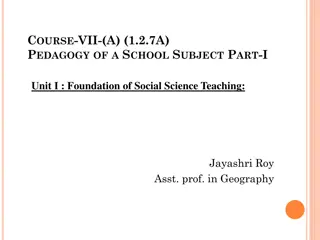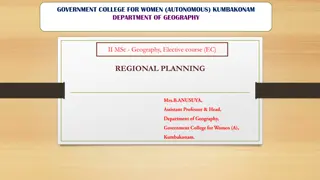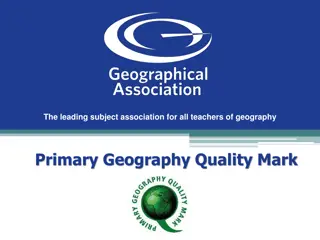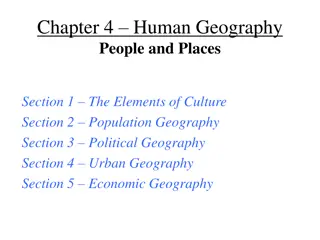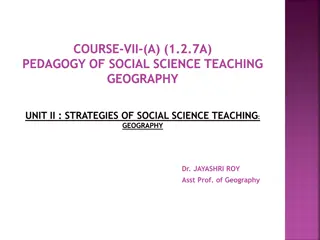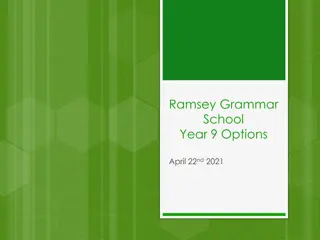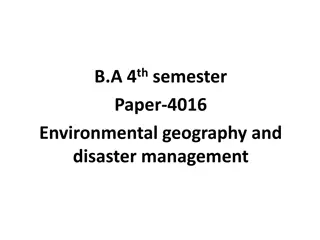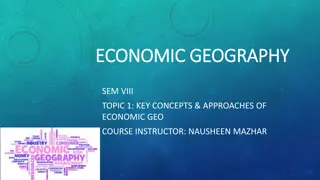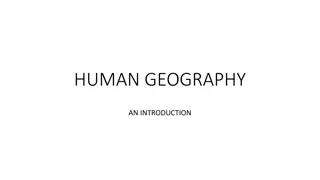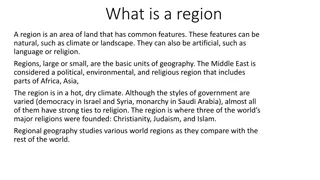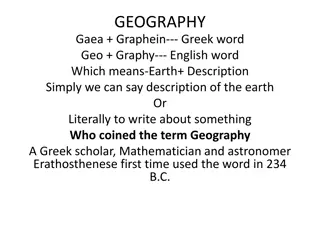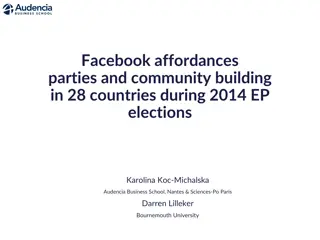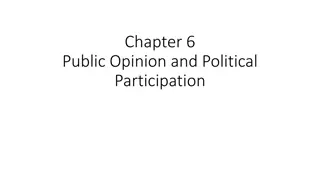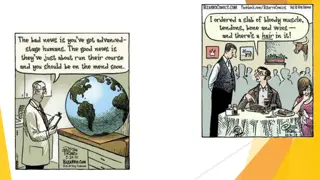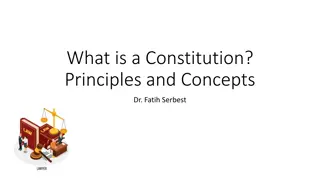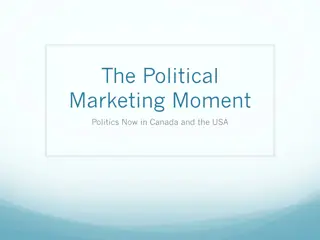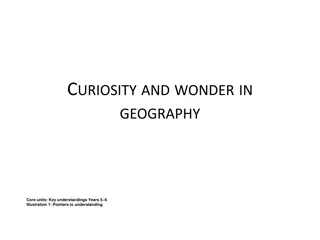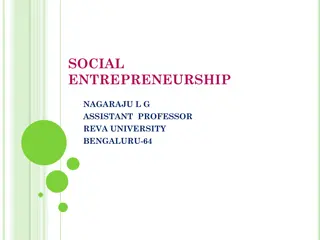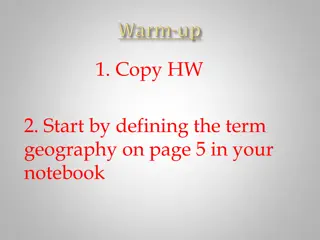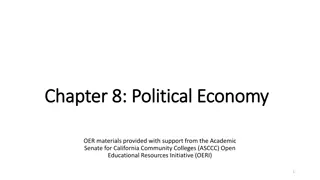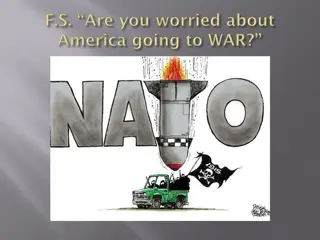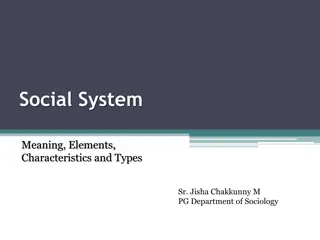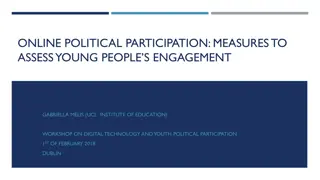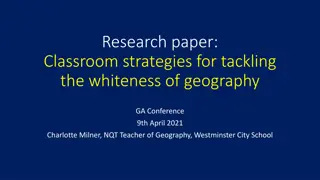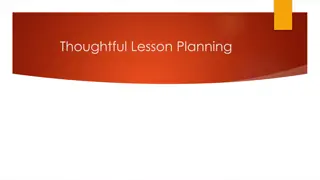The Role of Social and Political Issues in Geography Education
Exploring the integration of social and political issues in the geography curriculum, this content delves into how such learning aids moral development and addresses various challenges faced by society. It highlights the importance of geography as a bridge between science and humanities, emphasizing its role in nurturing critical thinking and societal awareness. Additionally, it discusses the impact of politicizing the curriculum, touching on recent debates and developments in education policy regarding the teaching of certain ideological approaches.
Download Presentation

Please find below an Image/Link to download the presentation.
The content on the website is provided AS IS for your information and personal use only. It may not be sold, licensed, or shared on other websites without obtaining consent from the author. Download presentation by click this link. If you encounter any issues during the download, it is possible that the publisher has removed the file from their server.
E N D
Presentation Transcript
TOWARDS AN EDUCATIONAL CASE FOR SOCIAL AND POLITICAL ISSUES IN THE GEOGRAPHY CURRICULUM DR ALEX STANDISH ASSOCIATE PROFESSOR OF GEOGRAPHY EDUCATION INSTITUTE OF EDUCATION, UNIVERSITY COLLEGE LONDON A.STANDISH@UCL.AC.UK @ALEXSTANDISH9
AIMS How does learning about social and political issues help with the moral development of the child/young person? Which social and political issues are taught in the geography curriculum and why?
A SCIENCE AND HUMANITIES SUBJECT Geography underpins a lifelong conversation about the Earth as the home of humankind (Geographical Association Manifesto 2009, p. 5). Learning about people and environments includes an understanding of the challenges people face in their given locality. Poverty and inequality, climate change, hazards (flooding, tectonic movement, weather), pollution, soil erosion, migration, production & consumption, development, sporting events, governance, political conflict.
DISCIPLINE TO SCHOOL SUBJECT Geography the discipline is concerned with the pursuit of truth (what is accurate, what is right and what is beautiful). But not does not tell us how to act in the world. Geography as school subject reflects these knowledge types, but within the context of holistic educational aims (specific to the country, state, school). Education is for qualifications, socialisation and subjectification (becoming human/an individual) (Biesta, 2012)
LIBERAL DEMOCRACIES Plato (Republic): school subjects introduce the foundations of knowledge a basis for mutual understanding and public life. Education should prepare young people for democracy, economy and community. (Levinson, 1999) Socialisation (society) and subjectification (individual) Our culture provides a political basis for the curriculum (M Young: questions about who we are and what we believe)
POLITICISING THE CURRICULUM In the USA, legislation across 44 states to restrict the teaching of critical race theory and other ideological approaches (Schwartz, 2021) By governments: Sustainability and Climate Change: A Strategy for the Education and Children s Services Systems (DfE 2022) By advocacy groups/teacher activists Leads to one-sided teaching of issues pro-environment, anti-modernisation (Rawding, 2016) An instrumental approach to curricula that tends to treat students and schools as objects of desires and goals determined by others instead of recognising them as persons and institutions in their own right. (Van Poeck and stman, 2020, p. 1004)
HANNAH ARENDT CRISIS IN EDUCATION the same destruction of real living space occurs whenever the attempt is made to turn the children themselves into a kind of world. (Arendt, 1968, 183) Arendt makes the case for schools as the institutions that we interpose between the private domain of home and the world in order to make the transition from the family to the world. (Ibid., p.185) Children need to have a place of security where they can grow (Arendt, 1968)
Treating students as embryonic subjects in their own right - Teaching students how to think (moral reasoning) not what to think. (Hand, 2018) Impartiality Making it free means bringing things to the table for study and practice, so that the students can give their own meaning to it (Van Poeck and stman, 2020, p. 1007). ROLE OF THE TEACHER Consider ways of teasing out the moral stances adopted by students in the classroom as well as the values upon which they are based (McPartland, 2006) Modelling tolerance, as an educational aims and a pedagogical attitude and practice (Drerup, 2018).
Teaching to generate a 'culture of argument', where different accounts are listened to and where appropriate countered HOW CAN THE STUDY OF ISSUES CONTRIBUTE TO MORAL DEVELOPMENT? Trying to encourage a tone of 'confident uncertainty' - i.e. confident learners, who know that there is invariably more to know Addressing the most difficult questions, including conflicts, forced population movements, growing inequality and environmental sustainability Providing opportunities to practice making informed decisions and expressing viewpoints (McPartland, 2006)
EROSION OF THE BOUNDARIES OF KNOWLEDGE Especially the place and status of objective knowledge in the curriculum Why? Weakening of the boundaries between: Education and training Sites of specialist knowledge production and wider society Epistemic knowledge and perspectival knowledge (post-truth society?) (Wheelahan, 2010)
CONCLUSION Strengthen the boundary between the domains of education and political advocacy. When selecting and teaching of social and political issues teachers need educational aims (subjectification) in mind.
CURRICULUM DEVELOPMENT - FAWCETT FELLOWS Short course: Geography Curriculum Development One year, part time meeting 3 afternoons per term, UCL Institute of Education. Topics curriculum aims, curriculum selection and design, knowledge/skills/values, places and regions, social and political issues, fieldwork, diversity. 500 or through Fawcett Fellowship (applications due June 30th)
Arendt, H. (1968[2006]) Between Past and Future (chapter 5: the Crisis in Education). Penguin. Biesta, G. (2012) Becoming public: public pedagogy, citizenship and the public sphere, Social and Cultural Geography, 13.7, pp. 683-697. Drerup, J. (2018) Education for democratic tolerance, respect and the limits of political liberalism. Journal of Philosophy of Education, 52.3, pp. 515-532. Hand, M. (2018) A theory of moral education. Oxfordshire: Routledge. Levinson, M. (1999) The demands of liberal education. Oxford: Oxford University Press. Masschelein, J. and Simons, M. (2013) In Defence of the School: A public issue. Leuven: E-ducation, Culture & Society Publishers. Available at: https://philarchive.org/archive/MASIDO-2 McPartland, M. (2006) Strategies for approaching values education , in Balderstone, D. (ed) Secondary Geography Handbook. Sheffield: Geographical Association, pp. 170 79. Rawding, C. (2016) The challenges of environmental education. Teaching Geography, 41.1, pp.10-12. Van Poeck, K. and stman, L. (2020) The risk and potentiality of engaging with sustainability problems in education: A pragmatist teaching approach , Journal of Philosophy of Education, 54(4) pp.1003-1018. Wheelahan, L. (2010) Why knowledge matters in curriculum: A social realist argument. Oxfordshire: Routledge.





